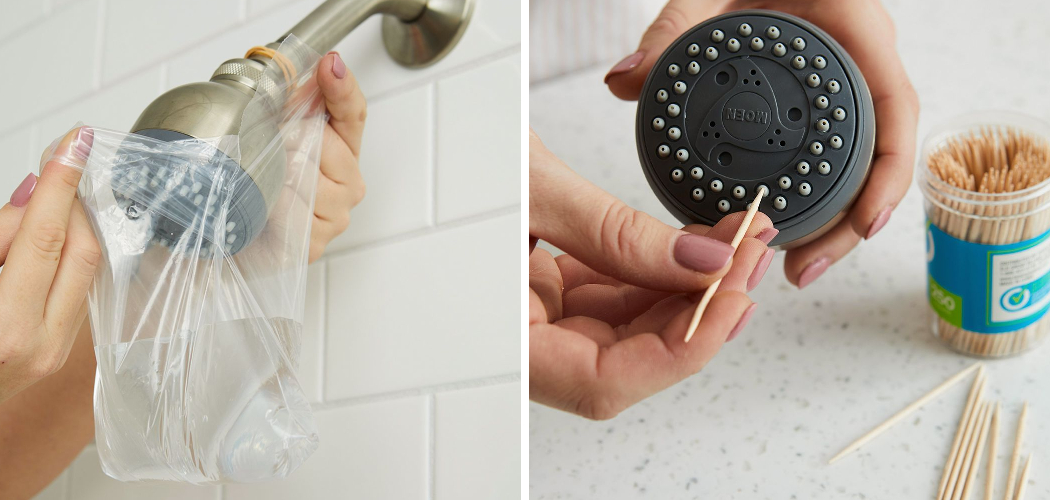Cleaning a shower head from hard water buildup is an essential task that not only improves the aesthetic of your bathroom but also ensures that your shower continues to function effectively. Over time, minerals in hard water can accumulate, leading to reduced water flow and unsightly stains. Fortunately, with a few simple techniques and household items, you can restore your shower head to its original condition, enhancing your shower experience and prolonging the life of your fixtures. In this guide, we’ll explore various methods on how to clean a shower head from hard water and keep your shower head sparkling clean.
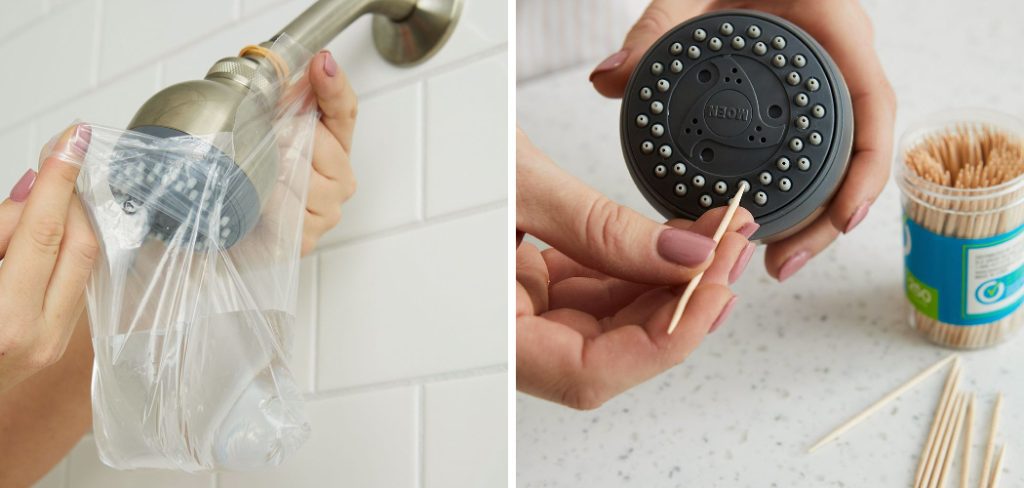
Understanding Hard Water Buildup
Hard water is water that contains high levels of dissolved minerals, primarily calcium and magnesium. When hard water flows through your plumbing system, it can leave behind mineral deposits, which accumulate over time, particularly in shower heads and faucets. This buildup can manifest as white, chalky stains or a gritty texture, which not only detracts from the aesthetic appeal of your bathroom but may also impact water flow and pressure.
Understanding the nature of hard water and its effects on plumbing fixtures is crucial for preventing buildup and maintaining the efficiency and appearance of your shower head. Regular cleaning and maintenance can mitigate these issues, ensuring a more enjoyable shower experience.
Tools and Materials Needed
To effectively clean your shower head from hard water buildup, you will need the following tools and materials:
- White Vinegar: A natural cleaning agent that effectively dissolves mineral deposits.
- Plastic Bag or Bowl: For soaking the shower head in vinegar.
- Rubber Band or String: To secure the bag if soaking the shower head.
- Old Toothbrush: For scrubbing away stubborn deposits.
- Baking Soda (optional): To create a paste for extra cleaning power.
- Lint-free Cloth or Sponge: For wiping down the shower head after cleaning.
- Water: For rinsing the shower head once cleaning is complete.
Having these items on hand will make the cleaning process quick and efficient, allowing you to restore your shower head to optimal condition.
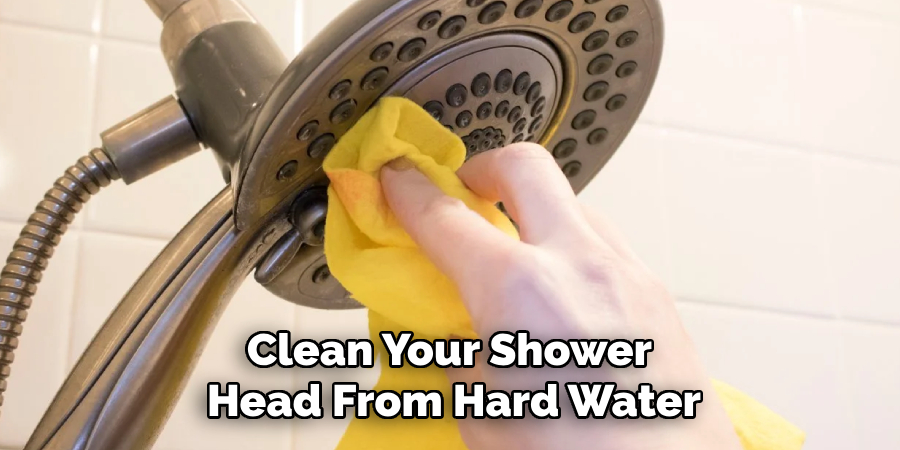
10 Methods How to Clean a Shower Head from Hard Water
1. Soak in White Vinegar for an Easy and Natural Clean
One of the most effective and natural methods to clean a shower head from hard water is by soaking it in white vinegar. Vinegar is a mild acid that can dissolve mineral deposits without harsh chemicals. Start by removing the shower head if possible, and place it in a bowl or bag filled with white vinegar. If the shower head cannot be removed, attach a plastic bag filled with vinegar around it, securing it with a rubber band. Allow the shower head to soak for several hours or overnight. After soaking, use an old toothbrush to scrub away any remaining residue. This method is safe, environmentally friendly, and highly effective for most types of mineral buildup.
2. Use Baking Soda for a Gentle Abrasive Clean
For a deeper clean, combine white vinegar with baking soda. Baking soda acts as a mild abrasive, helping to scrub away stubborn deposits. Start by making a paste with baking soda and a small amount of water. Apply the paste directly to the shower head, focusing on areas with visible buildup. Then, soak the shower head in vinegar as described above. The combination of vinegar and baking soda creates a fizzing reaction that helps lift away hard water stains. After soaking, rinse the shower head thoroughly with water and wipe it dry. This method not only cleans but also helps to polish and restore the shower head’s shine.
3. Scrub with a Toothbrush for Detailed Cleaning
Even after soaking in vinegar or a vinegar-baking soda mixture, some hard water deposits may remain. In these cases, an old toothbrush can be used for detailed cleaning. The bristles of the toothbrush are ideal for scrubbing between the small nozzles of the shower head, removing any remaining buildup. Apply a bit of vinegar or baking soda paste to the toothbrush and scrub gently but thoroughly. Focus on areas where water flow seems restricted or where visible deposits remain. This method allows you to reach and clean intricate parts of the shower head that may be missed during soaking.
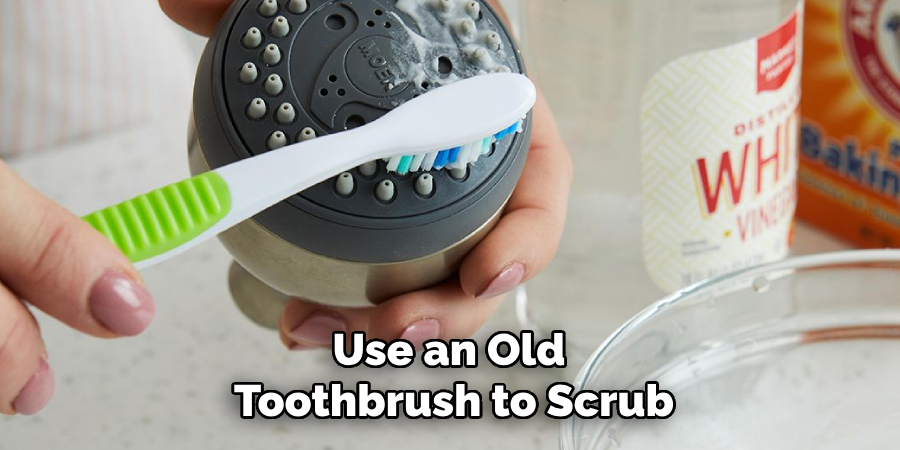
4. Use a Commercial Descaling Product for Heavy Buildup
For particularly stubborn hard water deposits that vinegar and baking soda cannot fully remove, a commercial descaling product may be necessary. These products are specifically designed to break down mineral deposits and are available at most hardware or home improvement stores. Follow the manufacturer’s instructions carefully, as these chemicals can be strong. Typically, you’ll need to soak the shower head in the descaling solution for a set period, then rinse thoroughly with water. While effective, it’s important to use these products sparingly and to ensure they are safe for your specific shower head material.
5. Lemon Juice for a Fresh and Natural Clean
Lemon juice is another natural acid that can effectively dissolve hard water deposits. It’s especially useful for people who prefer a natural, pleasant-smelling cleaner. Squeeze fresh lemon juice into a bowl and soak the shower head in it, or use a plastic bag secured around the shower head if it cannot be removed. Lemon juice not only cleans but also leaves a fresh scent and a shiny finish on your shower head. After soaking for several hours, scrub with a toothbrush if necessary and rinse thoroughly with water. This method is a natural, effective alternative to vinegar.
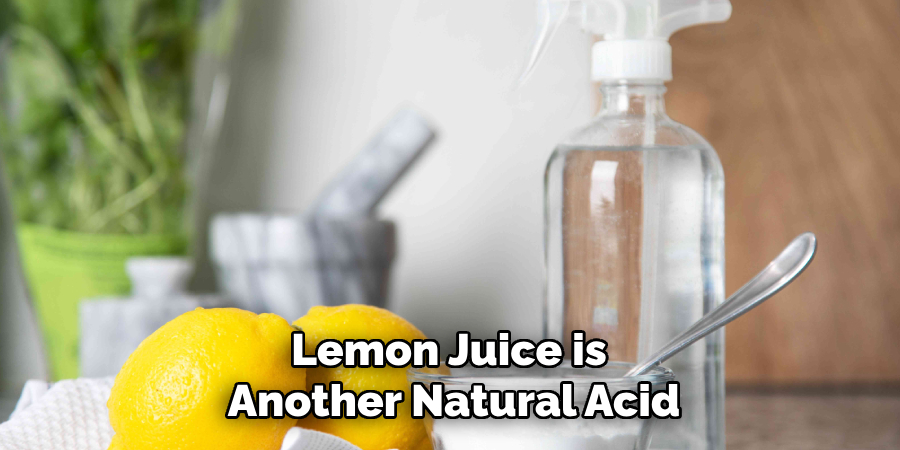
6. Boil the Shower Head for a Deep Clean
Boiling the shower head in water can help loosen and remove mineral deposits, especially if the buildup is particularly tough. Before boiling, ensure that your shower head can withstand high temperatures, as some materials may be damaged by boiling. If your shower head is made of metal, place it in a pot of water and bring it to a gentle boil. Allow it to simmer for about 15-20 minutes. The heat will help dissolve the mineral deposits, making them easier to scrub off afterward. After boiling, use a toothbrush to scrub away any remaining residue and rinse the shower head thoroughly.
7. Use a Pin or Needle to Unclog Nozzles
Over time, hard water deposits can clog the tiny nozzles of your shower head, reducing water flow. To clean these nozzles, use a pin or needle to carefully poke through the holes. This method is particularly useful for fixed shower heads that cannot be removed for soaking. Gently insert the pin into each nozzle, wiggling it slightly to dislodge any mineral deposits. After clearing the nozzles, run hot water through the shower head to flush out any remaining debris. This method is precise and helps restore full water flow, especially in older shower heads with significant buildup.
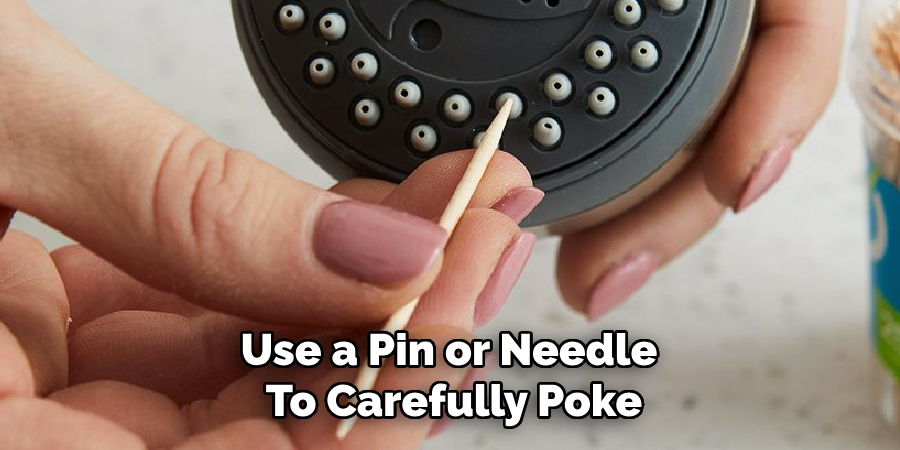
8. Use a Denture Tablet Solution for an Effervescent Clean
Denture cleaning tablets are designed to remove tough stains and buildup on dentures, making them a surprising but effective choice for cleaning shower heads. Dissolve a couple of denture tablets in a bowl of water, then soak the shower head in the solution. The effervescent action of the tablets helps to break down and lift hard water deposits. Allow the shower head to soak for at least an hour, then scrub with a toothbrush and rinse thoroughly. This method is gentle and works well for both metal and plastic shower heads, leaving them clean and fresh.
9. Regular Maintenance to Prevent Future Buildup
The best way to manage hard water buildup is through regular maintenance. After cleaning your shower head, establish a routine to prevent future deposits from accumulating. Wipe down the shower head after each use to remove water droplets that could leave mineral residues. Consider installing a water softener if you live in an area with particularly hard water, as this can significantly reduce the mineral content in your water and prevent buildup. Regular cleaning, such as soaking the shower head in vinegar every few months, will keep it in optimal condition and ensure a strong, consistent water flow.
10. Replace the Shower Head if Buildup is Severe
In some cases, the hard water buildup may be so severe that cleaning methods are no longer effective. If your shower head has been heavily damaged by mineral deposits and no longer functions properly, it may be time to replace it. Modern shower heads often come with anti-clogging features and are designed to be more resistant to hard water deposits. When choosing a new shower head, look for models that are easy to clean and maintain, and consider investing in one with built-in filtration to reduce the effects of hard water.
Conclusion
Maintaining a clean shower head is essential for ensuring optimal water flow and preventing the inconveniences associated with hard water buildup. By employing a variety of cleaning methods—from natural solutions like vinegar and lemon juice to more vigorous approaches like boiling and using denture tablets—you can effectively tackle mineral deposits. Regular maintenance, including routine cleanings and preventive measures, will prolong the lifespan of your shower head and enhance your bathing experience. Thanks for reading, and we hope this has given you some inspiration on how to clean a shower head from hard water!

